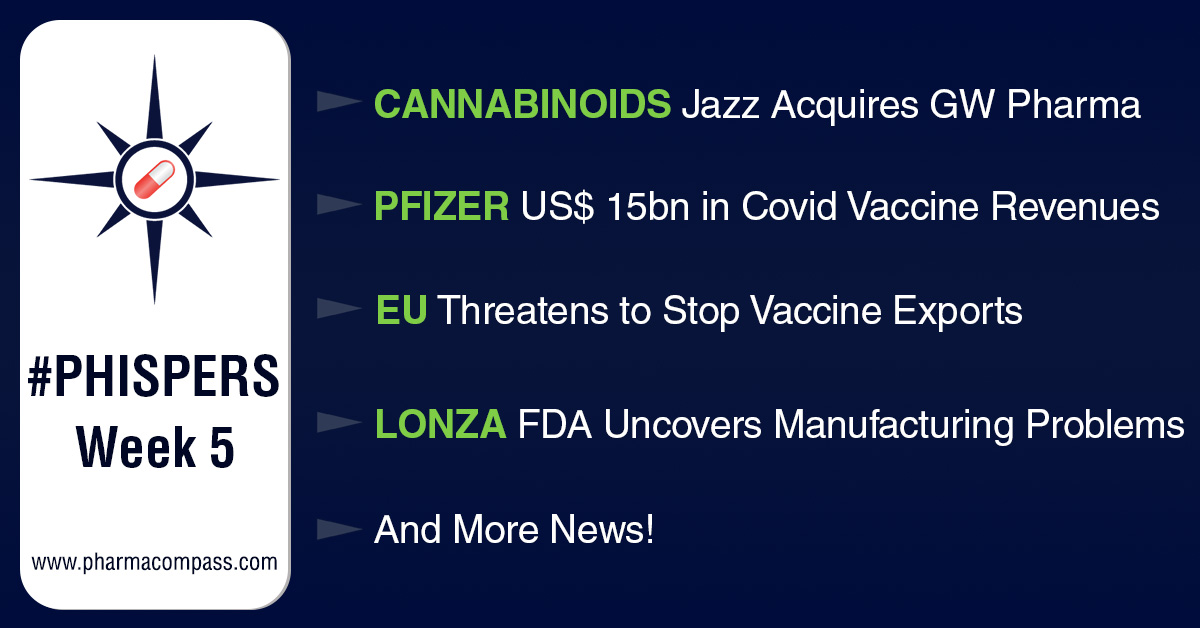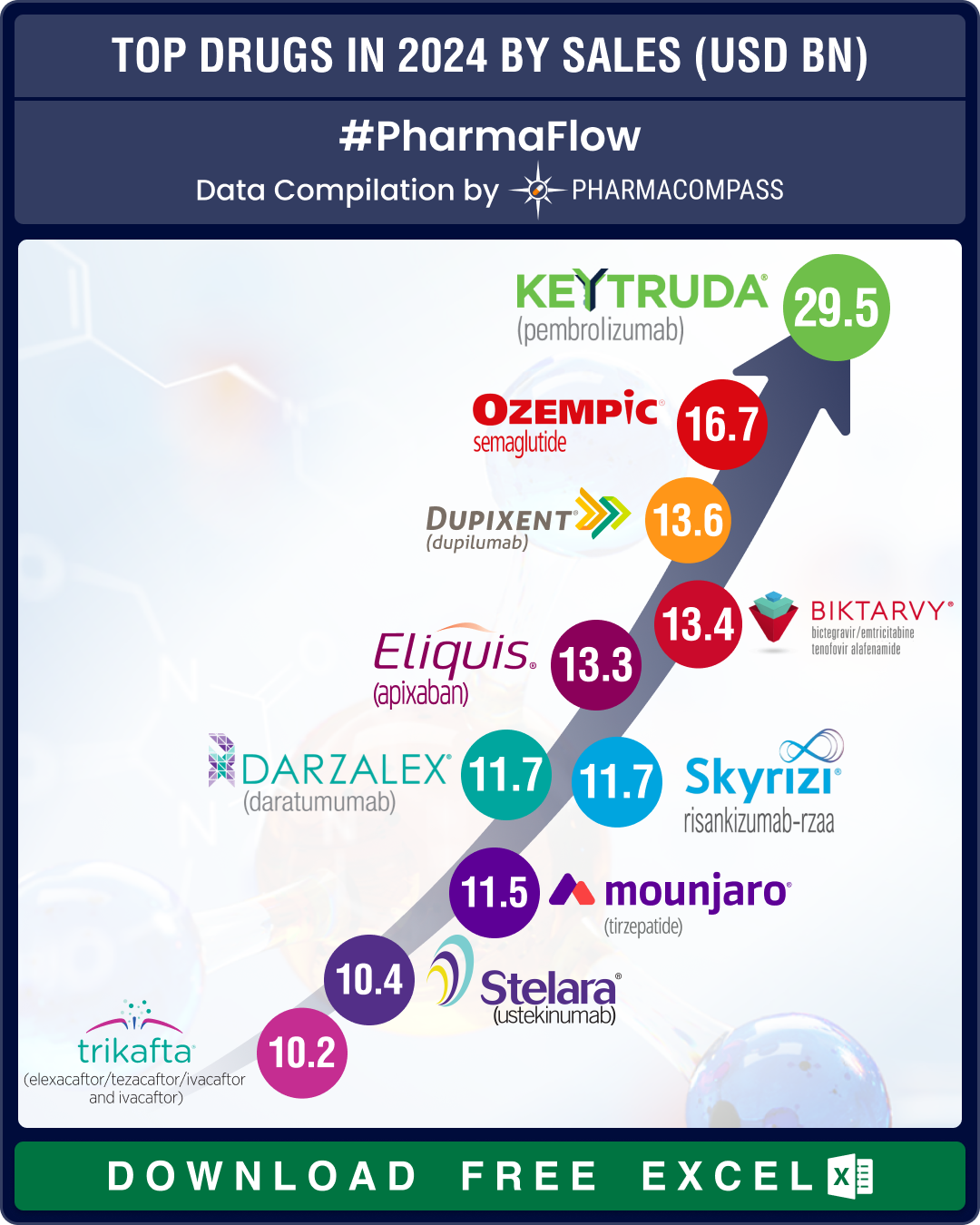
By PharmaCompass
2021-02-04
Impressions: 1710
This week, Phispers brings more updates on Covid vaccines. While American drug behemoth Pfizer said its Covid vaccine is likely to bring US$ 15 billion in 2021 revenues, drugmakers Johnson & Johnson, Sputnik V and Novavax announced the efficacy rates of their vaccines. The European Union intensified its fight to secure supplies of Covid vaccines and warned drug companies that it will use all legal means and even block exports if they do not honor their commitments. After Sanofi offered to produce 100 million doses of Pfizer’s vaccine for EU last month, Novartis too signed an initial agreement to produce the jab from its facility in Switzerland. Meanwhile, AstraZeneca-Oxford’s Covid vaccine bagged EMA authorization, but countries like Germany, Austria and France have said it should not be given to people over 65 years of age.
In non-Covid news, FDA issued Form 483 to Lonza’s facility in Houston, which is under contract to make viral vectors for Bristol Myers’ CAR-T therapy, seeking the agency’s nod for B-cell lymphoma. And in M&A news, Jazz Pharma acquired GW Pharma for US$ 7.2 billion, while Horizon Therapeutics picked up Viela Bio for US$ 3 billion.
Jazz Pharma buys cannabinoid drug maker GW Pharma for US$ 7.2 billion; Horizon picks up Viela Bio
This week saw the biggest M&A deal of 2021 thus far, as Jazz Pharmaceuticals said it will acquire GW Pharmaceuticals, the UK-based maker of the first prescription cannabinoid medicine approved by the US Food and Drug Administration, in a deal worth US$ 7.2 billion.
GW Pharma’s key drug — Epidiolex — is an oral solution of cannabidiol derived from the cannabis plant. In 2018, the FDA approved the use of this drug to treat Lennox-Gastaut syndrome and Dravet syndrome, two severe early-onset epilepsies. Since then, the drug has also been cleared for Tuberous Sclerosis complex.
Another big deal this week was Horizon Therapeutics’ decision to acquire Viela Bio, a rare disease drug company which was spun off AstraZeneca in February 2018. Horizon is nabbing Viela for around US$ 3 billion.
Through this acquisition, Horizon will add FDA-approved drug Uplizna to its portfolio of rare disease drugs. Uplizna is the first and only FDA-approved B-cell-depleting humanized monoclonal antibody for the treatment of neuromyelitis optica spectrum disorder (NMOSD), a rare, severe, autoimmune disease that attacks the optic nerve, spinal cord and brain stem, which leads to loss of vision and paralysis, in adults who are anti-aquaporin-4 (AQP4) antibody positive. The transaction is expected to close by the end of March 2021.
Viela bagged Uplizna’s approval in summer 2020 as a rival to Alexion’s Soliris — now being bought out by AstraZeneca — for patients suffering from NMOSD. Therefore, once AstraZeneca closes on its US$ 39 billion Alexion buyout, it will be competing against its own drug.
Pfizer’s Covid vaccine to bring in US$ 15 billion in revenues in 2021
Pharma behemoth Pfizer Inc has said its messenger RNA Covid-19 vaccine will bring in US$ 15 billion in cash during 2021. Pfizer’s research and development, which has historically been said to lag behind its peers, has also claimed a big spike in trial success rate.
Pfizer and its German partner BioNTech have lined up enough contracts to back a pledge that their vaccine will bring in US$ 15 billion in 2021. Pfizer has a revenue sharing deal with BioNTech, which created the vaccine. And Pfizer says it’s on track to deliver 200 million doses to the US by May-end, despite some supply problems.
Pfizer has also reported a sharp rise in its clinical trial success rate. Its end-to-end success rate increased from 9 percent in 2019 to 21 percent in 2020. In 2015, Pfizer had calculated that just 5 percent of its assets that entered first-in-human studies went on to win approval, compared to an industrywide success rate of 11 percent.
Pfizer also reported an improved Phase 3 success rate, which rose from 70 percent through 2015 to 85 percent in the new data.
This week, Pfizer reported its financial results for 2020 when it posted US$ 42 billion in revenues. Following the completion of the Upjohn business spin-off, Pfizer now operates as a single focused innovative biopharmaceutical company engaged in the discovery, development, manufacturing, marketing, sales, and distribution of biopharmaceutical products worldwide.
As EU threatens to stop exports, Novartis follows Sanofi in offering to produce Pfizer’s vaccine
Last week, we had covered news of how in Europe, the enthusiasm over Covid-19 vaccines had diminished after AstraZeneca said it would have to cut supplies to the EU and Pfizer said there would be a temporary impact on shipments.
This week, there is news that the EU has intensified its fight to secure supplies of Covid vaccines. The EU, whose member states are far behind Israel, the UK and the US in rolling out vaccines, has warned drug companies such as AstraZeneca that it will use all legal means or even block exports unless they agree to deliver the shots as promised.
European Council President, Charles Michel, said in a letter that the EU should explore legal means to secure supplies of Covid-19 vaccines it contracted to purchase, if negotiations with companies over delayed deliveries are unsuccessful.
According to a Reuters report, EU will soon start monitoring exports of Covid-19 vaccines in the 27-nation bloc. It could also block exports if the vaccine maker has not fulfilled its commitments. Under the system, any producer planning to export vaccines from the EU will have to send its plans to authorities in one of the 27 bloc countries.
Last week, after Sanofi said it would produce 100 million doses of Pfizer’s vaccine for the EU, Novartis announced that it has signed an initial agreement to provide manufacturing facilities to produce the Pfizer-BioNTech vaccine. The agreement will see Novartis utilizing its aseptic manufacturing facilities at its site in Stein (Switzerland) to produce the vaccine. Subject to reaching a final agreement, Novartis plans to commence production in the second quarter of 2021 and initial shipments of the vaccine are expected in the third quarter.
FDA issues Form 483 to Lonza, Bristol Myers’ manufacturing partner for liso-cel
Last year, Bristol Myers Squibb was hopeful of getting the US Food and Drug Administration (FDA) approval for its CAR-T therapy — lisocabtagene maraleucel (liso-cel) — for the treatment of adults with relapsed or refractory large B-cell lymphoma after at least two prior therapies. However, the FDA extended the action data by three months, with no decision taken even after its November 202o deadline.
The FDA approval of liso-cel by December 31, 2020 was one of the milestones of the contingent value rights (CVRs) issued upon the close of the Celgene acquisition to its investors. Since the approval never came through, Celgene investors lost out on the deal sweetener.
Last week, there was news that the FDA has issued a Form 483 to a Lonza facility in Houston, which is under contract to make viral vectors for liso-cel. According to reports, for now, the manufacturing shortfalls by Lonza has cost Bristol Myers the chance to bag FDA approval for its CAR-T therapy.
The week-long Lonza plant inspection, which was a part of liso-cel’s drug application review, came later than expected because of the pandemic. However, when the FDA inspectors finally arrived, the facility didn’t exactly have its act together.
The FDA has cited problems such as lack of differentiation measures in storage areas. In the highly-redacted document, the FDA inspectors note that there was no separate storage area for certain products to prevent mix-ups. Bottles intended for different markets, as well as materials derived from test runs were stored in the same bin. The same bin was also used to store an unidentified material that had been rejected by the facility’s quality unit.
Astra jab approved in Europe, but efficacy in question for those over 65 years of age
The European Medicines Agency (EMA) has approved the use of the Oxford-AstraZeneca Covid vaccine for all adults. However, questions have been raised about its efficacy in people over 65 years of age.
This is the third Covid-19 vaccine that the EMA has recommended for authorization, after giving the nod to vaccines by Pfizer-BioNTech and Moderna in the last two months. The EMA said the AstraZeneca vaccine was about 60 percent effective in trials.
AstraZeneca has been at the center of a dispute with the EU as it has pushed back on its commitment to provide 400 million doses of its vaccine to the bloc.
In Germany, the country’s vaccine committee said in a draft recommendation that the jab should only be given to people between 18 and 64 years of age. Similarly, health authorities in France and Austria have recommended that the vaccine should not be given to people over 65.
Meanwhile, a Reuters news report said around 1,500 of the initial volunteers in a late-stage clinical trial of the AstraZeneca vaccine were given the wrong dose, but weren’t informed that such a mistake had been made.
Efficacy of J&J, Sputnik V and Novavax vaccines: Three vaccine manufacturers recently announced the efficacy rates of their Covid-19 shots — Johnson & Johnson (J&J), Sputnik V and Novavax.
J&J said its single-dose vaccine was 66 percent effective in preventing Covid-19 in a large global trial against multiple variants. However, its efficacy varied across countries. In the trial of nearly 44,000 volunteers, the level of protection against moderate and severe Covid-19 varied from 72 percent in the United States to 66 percent in Latin America and just 57 percent in South Africa. The data showed that the vaccine’s effect on the South Africa variant was diminished compared to the unaltered virus. J&J plans to seek emergency use authorization (EUA) from the US Food and Drug Administration next week and will soon follow up with the European Union and the rest of the world. J&J has said it plans to deliver 1 billion doses of the vaccine in 2021, which it will manufacture in the US, Europe, South Africa, and India.
In Russia, scientists gave Sputnik V’s vaccine the green light this week, terming it almost 92 percent effective in fighting Covid-19, based on peer-reviewed late-stage trial results published in The Lancet. The results were based on data from 19,866 volunteers.
Similarly, Novavax Inc said its jab was 89.3 percent effective in preventing Covid-19 in a trial conducted in the United Kingdom, and was nearly as effective in protecting against the highly contagious UK variant. However, in a separate trial it appeared far less effective against the South African variant. The company said that this was interim data, and it hopes to apply for an EUA with regulators in two to three months.
The PharmaCompass Newsletter – Sign Up, Stay Ahead
Feedback, help us to improve. Click here
Image Credit : Phisper Infographic by SCORR MARKETING & PharmaCompass is licensed under CC BY 2.0
“ The article is based on the information available in public and which the author believes to be true. The author is not disseminating any information, which the author believes or knows, is confidential or in conflict with the privacy of any person. The views expressed or information supplied through this article is mere opinion and observation of the author. The author does not intend to defame, insult or, cause loss or damage to anyone, in any manner, through this article.”








